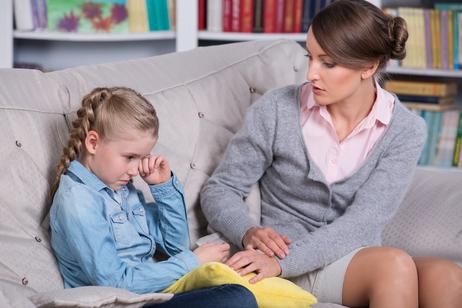Has your child started to withdraw from friends and family? Does he spend a lot of time on his own, seemingly uninterested in activities he once enjoyed? Have you noticed changes in his behavior, sleep, or eating habits? If you answered “Yes” to any of these, your child could be depressed. Many people think of depression and other mental health issues as adult problems, but the truth is that they can affect young adults and children as well.
Mental health problems are nothing to scoff at and they certainly shouldn’t be ignored. Childhood mental illness can affect the rest of your child’s life, depending on whether he gets treatment at a young age or not. Every child experiences mental illness differently so it is your job as a parent to know your child well enough to identify the signs and to take the initiative in seeking treatment. Keep reading to learn more about mental illness in children and to receive tips for supporting your child.
Mental Health Issues in Public Schools
According to the CDC, as many as one in five kids in the United States will exhibit signs of mental illness in any given year. This means that in a typical classroom of 25 students, as many as five of them will be struggling with anxiety, depression, ADHD, or other forms of mental illness. Unfortunately, about 80% of children who suffer from mental illness don’t get the treatment or support that they need which ultimately leads them in a downward spiral. In addition to dealing with the psychological challenges of mental illness itself, these children struggle to keep up with their schoolwork, have difficulty making or keeping friends, and live under a constant cloud of stress and low self-esteem.
This video animation will help start the conversation about mental health.
The National Alliance on Mental Illness (NAMI) is an organization that is working to advocate for services that help schools provide children suffering from mental illness with the support they need. These services include programs to send trained community health professionals into the schools or to provide parents with links to community programs. NAMI also works to increase funding for schools to train faculty and staff in matters of mental illness. Even with all of their efforts, however, more support is always needed and there are too many children falling through the cracks.
How Does Depression Affect School Children?
The twelve or so years that a child spends in school can be challenging in many ways but children suffering from depression and other mental health issues experience a higher level of difficulty. Up until the 1980s, scientists believed that children couldn’t experience depression but this has since been proven untrue – children may experience depression differently than adults but it is just as much a problem. In fact, as many as 5% (about 1 in 20) of children will experience a significant depressive episode by the time they reach age 19. Furthermore, fewer than half of the children struggling with mental illness receive the treatment they need.
This video is part of a series on anxiety and depression.
The cause of childhood depression remains unknown but researchers have identified certain risk factors and potential triggers. Experiencing a devastating loss or trauma is a major trigger for childhood depression and other mental health issues like anxiety, ADHD, and learning disabilities can contribute to depression as well. In many cases, mental illness seems to run in families. Symptoms of depression in children and teens include the following:
- Frequent sadness and episodes of crying
- Increased irritability or anger
- Feelings of hopelessness
- Decreased interest in activities once enjoyed
- Low energy levels
- Frequent complaints of pain or illness
- Low self-esteem and confidence
- Withdrawal from family and friends
- Heightened sensitivity to failure or rejection
- Difficulty concentrating in school
- Changes in sleep (too much or too little)
- Thoughts of suicide
- Changes in eating habits and/or weight
In both children and adults, depression is no laughing matter and it is not a character flaw or a weakness. Mental illness is just as real as other forms of illness and, left untreated, it can lead to some serious consequences. If you have a child struggling with depression, keep reading to learn some tips for supporting your child and for getting him the help he needs.
Tips for Parent and Teacher Involvement
Watching your child struggle with depression can be heartbreaking. As difficult as it may be to accept your child’s mental illness, however, it is your job as a part to give your child the love and support he needs. This may mean admitting your own shortcomings and reaching out to a professional for help. You may also want to get your child’s teachers involved so they can provide additional support while your child is at school. Here are some other tips for parent and teacher involvement to support a child suffering from depression:
- Pay attention to your child. As your child gets older it only makes sense that he will become more independent. This doesn’t mean you shouldn’t still keep tabs on him, however. Pay close attention to your child’s behavior and habits so you’ll be more likely to notice if something changes.
- Be calm and steadfast. Childhood is a scary and confusing time so one of the best things you can do to support your child is to remain calm, even when your child is becoming anxious or worried. Don’t be overbearing but do be sure to tell your child that you are there for him and make sure he feels your love and support in a tangible way.
- Do your own research. Don’t try to diagnose your child’s mental health problems yourself, but it’s a great idea to do some of your own research. Once your doctor has made a diagnosis, learn as much as you can about your child’s condition and how to help manage it.
- Affirm and encourage your child. Even though your child may not completely understand what is happening to him, you need to make sure he knows that it isn’t his fault and that it isn’t something to be ashamed of. Let your child know it’s okay to be sad or worried – make sure he knows you are there for him no matter what.
- Be open with your child. Children suffering from depression often become withdrawn but, as a parent, you should try to bring him out and engage him in open conversation. If your child is able to talk through some of his thoughts or feelings it could help to improve his condition.
- Be patient with your child. Depression is difficult for people who have never experienced it to understand. You may not know exactly what your child is going through but you need to be patient, loving, and understanding if you want to help him get through it.
This video offers help with depression.
If your child suffers from depression or any other form of mental illness, understand that it isn’t something he can control, and by no means is it his fault. The more you understand your child’s condition, the better you will be able to give him the support he needs but don’t stop there! Take steps to ensure that your child also gets the professional help and treatment he needs.
Questions? Contact us on Facebook. @publicschoolreview














